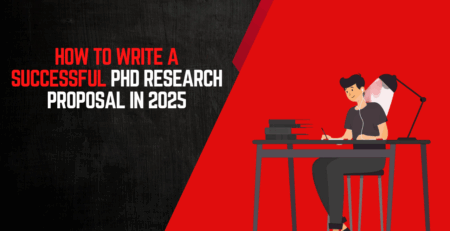How to Avoid Burnout and Writer’s Block During Your PhD Journey?
Kenfra Research - Bavithra2025-09-26T17:05:35+05:30Pursuing a PhD is an exciting but demanding academic journey. While it offers opportunities to explore research deeply and contribute new knowledge, the pressure, long hours, and constant deadlines can lead to PhD burnout and writer’s block. These challenges are common among students worldwide and can impact both mental health and academic productivity. In this blog, we’ll explore practical strategies to manage stress, stay motivated, and maintain a productive workflow.
How to Avoid Burnout During Your PhD?
PhD burnout is a state of emotional, physical, and mental exhaustion caused by prolonged academic stress. Many students experience it due to the constant pressure of research, deadlines, and expectations. Recognizing the signs early is crucial to preventing long-term negative effects on mental health and academic performance.
Common signs of PhD burnout include:
- Chronic fatigue and low energy
- Loss of motivation for research tasks
- Feeling emotionally drained or disconnected from work
- Irritability and decreased focus
To avoid burnout during your PhD journey, consider the following strategies:
- Prioritize Self-Care: Your physical and mental well-being directly affects productivity. Regular exercise, and adequate sleep are very essential. Even short breaks for a walk or mindfulness exercises can significantly reduce stress levels.
- Set Realistic Goals: Break down your PhD tasks into smaller, achievable milestones. Instead of focusing solely on completing an entire chapter, aim to complete a paragraph, a table, or a section. Achieving these smaller goals provides a sense of accomplishment and keeps motivation high.
- Manage Time Effectively: Organize your daily schedule to balance research, writing, and personal time. Tools like calendars, task management apps, and the Pomodoro technique can help maintain focus and prevent overwork.
- Establish Boundaries: Learn to say no to distractions or commitments that do not align with your research priorities. Protecting your time is crucial for avoiding burnout.
- Stay Connected: Engaging with mentors, peers, or academic communities can provide emotional support, advice, and encouragement. Sharing challenges and successes helps reduce feelings of isolation, which is a major contributor to burnout.
- Practice Mindfulness and Relaxation Techniques: Meditation, deep breathing, or yoga can help reduce stress, improve focus, and foster a sense of calm during challenging research periods.
By consistently applying these practices, PhD students can significantly reduce the risk of burnout, maintain mental health, and stay productive throughout their research journey. Remember, avoiding burnout is not about working harder but working smarter and caring for yourself.
How to Avoid Writer’s Block During Your PhD?
Writer’s block is a common challenge for PhD students, often arising from stress, perfectionism, or fatigue. It can prevent progress on thesis writing, research papers, or academic articles. Understanding how to overcome this obstacle is essential to maintain PhD motivation and academic productivity.
Signs of writer’s block include:
- Difficulty starting writing tasks
- Feeling stuck or unsure how to continue
- Overthinking ideas without producing output
- Anxiety over producing perfect drafts
Here are strategies to overcome writer’s block during your PhD:
- Create a Consistent Writing Routine: Dedicate specific hours each day to writing. Even short, focused sessions of 30–60 minutes can help build momentum and reduce procrastination.
- Break Tasks into Small Sections: Focus on completing individual paragraphs, figures, or sections rather than the entire chapter at once. Small wins build confidence and reduce anxiety.
- Use Freewriting Techniques: Set a timer and write continuously without worrying about grammar or perfection. This encourages idea flow and helps overcome mental barriers.
- Change Your Environment: A new workspace or quiet study area can stimulate creativity and help you focus. Some students find writing in libraries, cafes, or outdoor spaces particularly effective.
- Set Realistic Expectations: Perfectionism can fuel writer’s block. Allow yourself to write rough drafts first and edit later. Remember, writing is a process, and improvement comes in revisions.
- Seek Feedback Early: Sharing drafts with supervisors, mentors, or peers can provide direction, reduce anxiety, and help you overcome mental blocks.
- Incorporate Brainstorming Tools: Outlines, mind maps, or research notes can help organize ideas before writing, reducing the cognitive load and making writing feel more manageable.
- Take Care of Mental and Physical Health: Fatigue, stress, and poor focus contribute to writer’s block. Balanced nutrition, sleep, exercise, and mindfulness practices improve cognitive function and creativity.
By applying these strategies, PhD students can overcome writer’s block, maintain steady writing progress, and reduce academic writing stress. Combining these techniques with effective self-care ensures sustainable productivity and mental well-being during your PhD journey.
Conclusion
Experiencing PhD burnout and writer’s block is common, but both can be effectively managed with the right strategies. Prioritizing self-care, maintaining motivation, managing stress, and implementing structured writing routines are key to overcoming these challenges. Remember, your PhD journey is a marathon, not a sprint—balanced effort and consistent self-care lead to long-term success.
For expert guidance on research productivity, mental health, and academic writing strategies, explore resources from Kenfra Research, a trusted partner for PhD students.











Leave a Reply